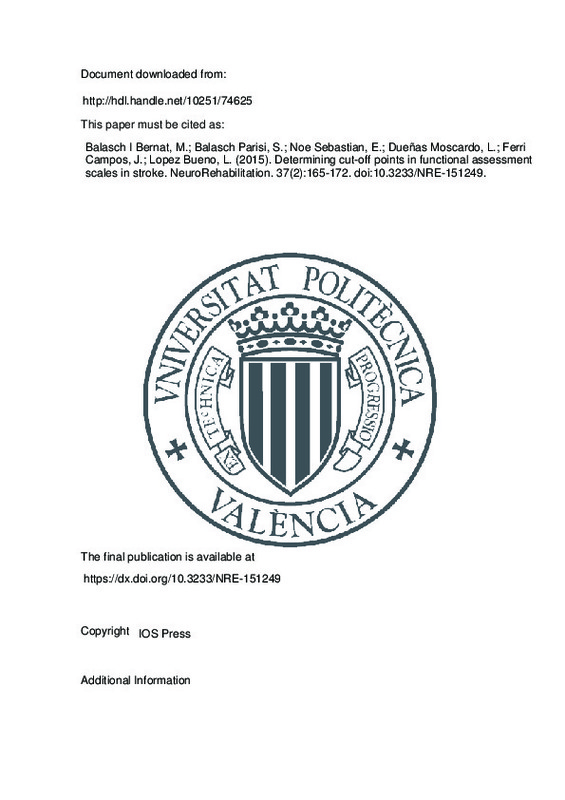JavaScript is disabled for your browser. Some features of this site may not work without it.
Buscar en RiuNet
Listar
Mi cuenta
Estadísticas
Ayuda RiuNet
Admin. UPV
Determining cut-off points in functional assessment scales in stroke
Mostrar el registro sencillo del ítem
Ficheros en el ítem
| dc.contributor.author | Balasch i Bernat, Merce
|
es_ES |
| dc.contributor.author | Balasch Parisi, Sebastià
|
es_ES |
| dc.contributor.author | Noe Sebastian, Enrique
|
es_ES |
| dc.contributor.author | Dueñas Moscardo, Lirios
|
es_ES |
| dc.contributor.author | Ferri Campos, Joan
|
es_ES |
| dc.contributor.author | Lopez Bueno, Laura
|
es_ES |
| dc.date.accessioned | 2016-11-25T12:51:44Z | |
| dc.date.available | 2016-11-25T12:51:44Z | |
| dc.date.issued | 2015 | |
| dc.identifier.issn | 1053-8135 | |
| dc.identifier.uri | http://hdl.handle.net/10251/74625 | |
| dc.description.abstract | [EN] BACKGROUND: A wide variety of well-validated assessment scales of functioning and disability have been developed for stroke population. However, these instruments have limitations in their interpretation. Therefore, determining cut-off points for their categorization becomes necessary. OBJECTIVES: To determine cut-off points for the BI, FIM and FAM scales to differentiate clinical disability categories and to establish the relationship between mRS and DOS scales. METHODS: One hundred and six adults with ischemic or haemorrhagic stroke were mainly recruited from a rehabilitation facility (Hospitales Nisa, Valencia, Spain). RESULTS: A high correlation was observed between the DOS and mRS scales (Kendall's tau-b = 0.475; p = 0.000) although a certain amount of disagreement between the two scales was detected. The cut-off points were 62.90 (95% CI, 57.26-69.29) and 21.30 (95% CI, 16.34-26.03) for the BI; 70.62 (95% CI, 66.65-75.22) and 38.29 (95% CI, 34.07-42.25) for the FIM; and 116.07 (95% CI, 110.30-122.68) and 66.02 (95% CI, 59.20-72.35) for the FAM. CONCLUSION(S): DOS was observed to be more demanding than the mRS, in terms of patient independence. Additionally, the lower cut-off points separating the levels of severe and moderate disability in the BI, FIM and FAM were determined. These findings would facilitate practitioners clinical interpretation of disability levels in post-stroke patients. | es_ES |
| dc.language | Inglés | es_ES |
| dc.publisher | IOS Press | es_ES |
| dc.relation.ispartof | NeuroRehabilitation | es_ES |
| dc.rights | Reserva de todos los derechos | es_ES |
| dc.subject | Stroke | es_ES |
| dc.subject | Activities of daily living | es_ES |
| dc.subject | Disability | es_ES |
| dc.subject | Rehabilitation | es_ES |
| dc.subject | Clinical evaluation | es_ES |
| dc.subject.classification | ESTADISTICA E INVESTIGACION OPERATIVA | es_ES |
| dc.title | Determining cut-off points in functional assessment scales in stroke | es_ES |
| dc.type | Artículo | es_ES |
| dc.identifier.doi | 10.3233/NRE-151249 | |
| dc.rights.accessRights | Abierto | es_ES |
| dc.contributor.affiliation | Universitat Politècnica de València. Escuela Técnica Superior de Ingeniería Agronómica y del Medio Natural - Escola Tècnica Superior d'Enginyeria Agronòmica i del Medi Natural | es_ES |
| dc.description.bibliographicCitation | Balasch I Bernat, M.; Balasch Parisi, S.; Noe Sebastian, E.; Dueñas Moscardo, L.; Ferri Campos, J.; Lopez Bueno, L. (2015). Determining cut-off points in functional assessment scales in stroke. NeuroRehabilitation. 37(2):165-172. doi:10.3233/NRE-151249 | es_ES |
| dc.description.accrualMethod | S | es_ES |
| dc.relation.publisherversion | https://dx.doi.org/10.3233/NRE-151249 | es_ES |
| dc.description.upvformatpinicio | 165 | es_ES |
| dc.description.upvformatpfin | 172 | es_ES |
| dc.type.version | info:eu-repo/semantics/publishedVersion | es_ES |
| dc.description.volume | 37 | es_ES |
| dc.description.issue | 2 | es_ES |
| dc.relation.senia | 298005 | es_ES |







![[Cerrado]](/themes/UPV/images/candado.png)

